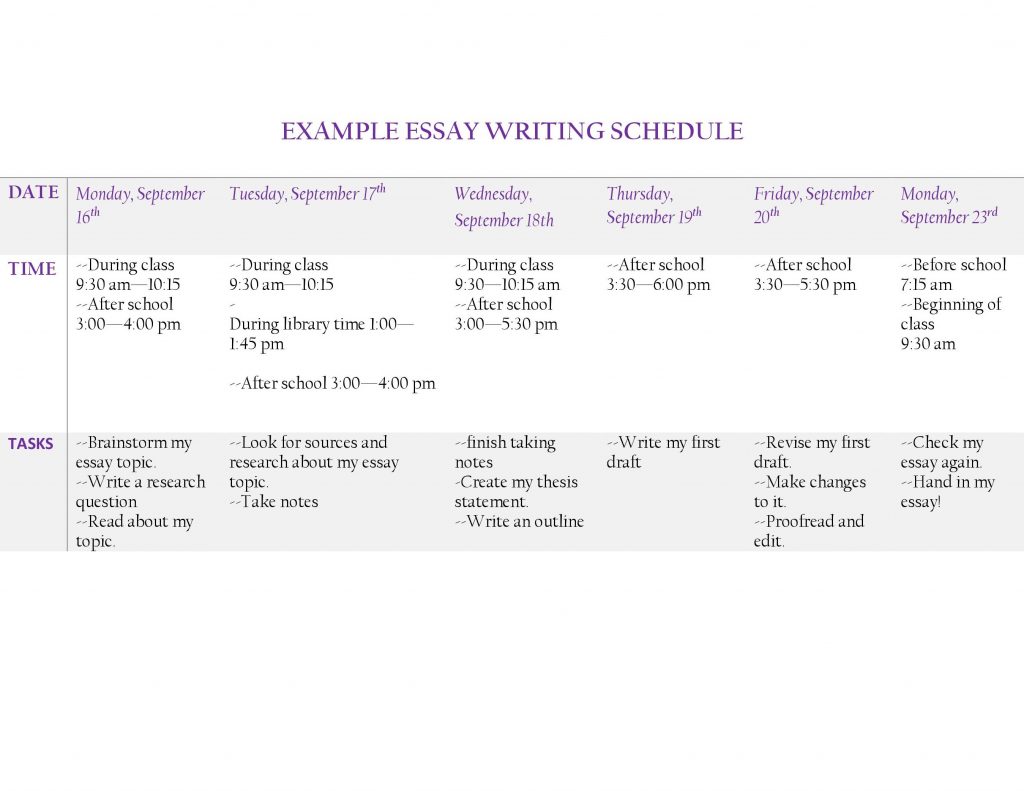Can middle school students learn something from college writers?
When Maria Johnson, a middle school and high school English tutor, asked me to write about what middle school writers can learn from college writers—I was lost. It’s a challenging question. I wasn’t even sure there was a good answer.
However, when I can’t figure out what to write, I brainstorm.
I grabbed my writer’s notebook and wrote the question “What could middle school students learn from college writers?” I drew a mind map and I wrote down my thoughts.
As I listed ideas, I realized there are 3 important concepts middle school writers can learn from college students. College students use different writing strategies to help them write research papers and other academic projects. Middle school students can use those same strategies with their writing.
3 College Writing Strategies Middle School Writers Can Master
#1 Create a writing schedule and stick with it.
In college, students have to juggle a lot of classwork. On average college students have at least 3 hours per week of homework for each class they take. They need to manage their time and plan how they will get their work done.
Successful students create a writing schedule and follow it. They plan out each phase of the writing and research process. While college students create writing schedules for research papers, middle school students can create a schedule for writing their essays.
Here’s how you can create a writing schedule for an essay.
- Write the details of your writing assignment. Make sure you write down the requirements and the date your essay is due.
- List all the tasks you need to do to complete the assignment. Include all the phases of the writing process: brainstorming topics, researching your topic, taking notes, planning your essay, writing the first draft, revising your essay, editing your essay and handing it in.
- Look at everything you need to do, and write down a date and time of when you will do each task.
- Put your schedule someplace where you can see it.
- Stick to your schedule, and do your work!
Below is an example of a writing schedule for an essay.

#2 Brainstorm and write a research question before you write a thesis statement.
I have a lot of new college students come to me not knowing what a research question is and how it helps them. It is a question about your essay topic. You look for evidence that will answer your question.
Here’s an example of a research question, “How does smoking e-cigarettes affect teenagers?”
You would take this question and look for sources. Once you gather information from those sources you can write a thesis statement about the effects of smoking e-cigarettes.
A lot of times people write a thesis statement based on their opinion of a topic, but they don’t know how to support their topic with facts.
Facts are important in writing academic papers and essays. If you find some background information and facts first, you’ll be able to write a thesis statement that you can support.
You can create a research question a couple of ways. One way is to brainstorm ideas.
- List things you want to learn about that topic.
- Look at what is most interesting to you.
- Write a question about that idea.
The second approach is to ask The Journalist’s Questions.
- Write down your topic.
- Ask these questions about your topic: Who? What? When? Where? Why? and How?
- After asking those questions write down follow-up questions.
- Keep doing that until you find a question you like.
Want to learn about writing a thesis statement? Check out Maria Johnson’s post. https://tutoringwithmaria.com/2019/04/03/what-can-university-students-learn-from-middle-school-writers/
#3 Keep a reading journal and write about what you read (every week).
I recommend to all of my college students that they read academic texts outside of class, and write about what they read in a journal. This helps them become better academic readers and writers, so they can excel in their classes.
In middle school, you can do something similar. Read at least 1 newspaper article, story, poem, or book that interest you every week. Write your thoughts about what you read in a journal. Your journal entries don’t have to be long but write at least 1 paragraph.
Here are some questions you can answer in your journal:
- What did I learn?
- What do I like or dislike about what I read?
- What do I agree or disagree with in the article?
- If it’s a story, who is my favorite character and why?
- If it’s a poem, what do I think of it?
- What strikes me the most about what I read?
- Is there anything I can do to make what I read better?
When you write about what you read, you’ll improve your reading, writing and critical thinking skills. These are crucial skills college students need if they want to do well in their classes. If you master them now, you’ll be a success in college.
Two fantastic websites for articles on topics that interest you are https://www.sciencenewsforstudents.org/ and https://www.dogonews.com/.
How Middle School Writers Can Improve Their Writing
There are many differences between college writers and middle school writers. In college, students write longer in-depth papers and middle school students focus more on essays. However, there are things both groups of writers can learn from each other.
Middle school writers can adapt the same strategies college writers use: creating a writing schedule and sticking to it, brainstorming a research question and writing in a reading journal.
College writers can also learn from things middle school writers do. Curious what those things are? Read what Maria Johnson has to say in the second part of this blog post at https://tutoringwithmaria.com/2019/04/03/what-can-university-students-learn-from-middle-school-writers/ You’ll see the concepts that college writers can learn from middle school writers.
Photo by Thought Catalog on Unsplash


